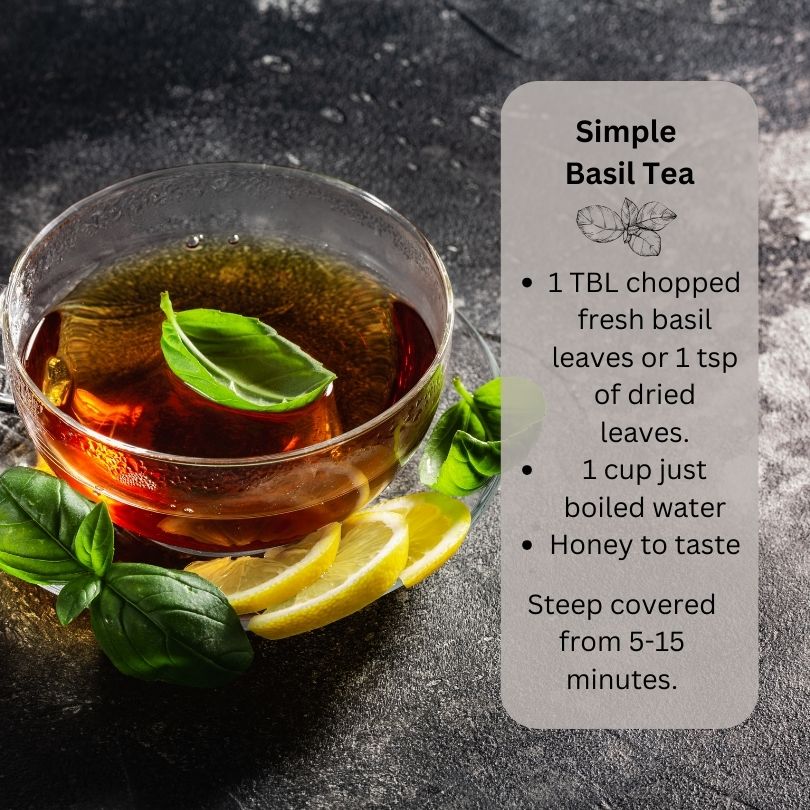Sweet Basil Secrets: From Mood Boosts to Digestion Support
Sweet Basil (Ocimum basilicum), a beautiful and beloved culinary herb from the mint family, is as versatile as it is flavorful.

Known as “The Queen of Herbs,” basil has a rich history in kitchens, pastas and pizzas and herbal medicine cabinets alike. Beyond its delightful aroma and taste, basil is packed with actions that make it a valuable herb for everyday use.

The Energetics of Basil
Basil’s energetics are warm and dry, making it an excellent herb for addressing cold, damp conditions in the body. Whether you’re looking to uplift your mood or support digestion, basil is ready to lend a hand.
Basil’s Actions and Uses
Basil’s therapeutic actions include carminative, antispasmodic, antimicrobial, diaphoretic, and nervine properties.
While many culinary herbs share some of these actions, basil has a special affinity for calming the nervous system, uplifting the mood, and increasing alertness—a combination that’s not commonly found in other herbs.
Here are some of basil’s key uses:
1. Digestive Support
Antispasmodic Properties: Basil’s ability to relieve gas and gas pain is another reason it shines as a digestive ally. It relaxes the muscles of the digestive tract, encouraging the “rest and digest” response that our bodies need.
Carminative Action: Basil helps ease upset stomachs, reduce bloating, and alleviate overall digestive discomfort. Its warming and drying properties make it especially useful for heavier meals that can lead to digestive stagnation—that uncomfortable fullness after overindulging in a big meal.

2. Nervous System Support
As a nervine, basil is a mood-lifting herb that increases alertness while simultaneously calming the nervous system.
This unique combination makes it a great choice for those experiencing stress, tension, or even mild depression. Currently, studies are being conducted to learn its potential in managing depression more effectively.
3. Immune and Respiratory Health
- Colds and Flu: Basil’s diaphoretic properties can help bring on a sweat to break a fever. Drinking basil tea is a simple way to tap into this benefit.
- Sore Throat: A basil tea gargle can soothe an irritated throat.
- Sinus Congestion: Basil promotes sinus drainage, helping to relieve congestion during a cold or a respiratory infection.
4. Insect Repellent
Basil’s high volatile oil content doesn’t just give it its signature aroma—it also acts as a natural insect repellent. Bugs hate these wonderful aromatics that we love so much.
This makes basil-infused oils and sprays a practical addition to your natural toolkit.
Historical and Cultural Notes

Basil has been cherished for centuries in many cultures and traditions.
In Italian cuisine, it’s a cornerstone ingredient, celebrated in classic dishes like pesto (links to recipes below), Caprese salad and pizza!
In Ayurvedic medicine, it’s revered for its ability to balance the body’s energies and is often used to reduce stress and promote mental clarity.
The ancient Greeks referred to it as the “king of herbs” and believed it brought protection and prosperity.
These historical uses highlight both its medicinal and culinary significance around the world.
How to Use Basil
Incorporating basil into your daily life is easy and delicious! Here are some ways to use it:
- As a Tea: Brew fresh or dried leaves to make a tea for digestive support, fever reduction, or calming the nerves. Here’s a simple recipe.
- Food: Add it to soups, salads, or pasta dishes. We all know how well it works with tomatoes, garlic, and olive oil.
- Pesto: Blend basil with nuts, olive oil, garlic, and Parmesan cheese for a classic pesto that’s both flavorful and functional. Below are a couple more pesto recipes for you to try.

- Infused Vinegars and Oils: Create herbal vinegars or oils by steeping fresh basil in your base of choice. These infusions are great for cooking or drizzling over dishes. Remember that if you’re using fresh leaves to make these infusions, use them up quickly and keep it in a cool place to avoid bacerial growth that can come from the moisture in the leaves.
Tips for Growing Basil

It thrives in pots or gardens with well-drained soil and plenty of sunlight.
It even reseeds itself, as I’ve experienced firsthand when it came back from a pot I had planted the previous year.
For a continuous supply, pinch off the flowers as they appear to encourage more leaf growth. You’ll be able to use it all summer and into early fall this way.
A Final Note
Sweet basil is more than just a culinary herb; it’s a versatile ally for your digestive system, nervous system, and overall well-being. Whether you’re sipping it as tea, enjoying it in a meal, or using it to uplift your mood, it earns its title as “The Queen of Herbs.”
If you haven’t already, try incorporating basil into your kitchen and herbal remedies. Its combination of flavor and functionality makes it a true treasure in any home.
Comment below and let me know all the ways you use basil and any new ways you’d like to try it.
